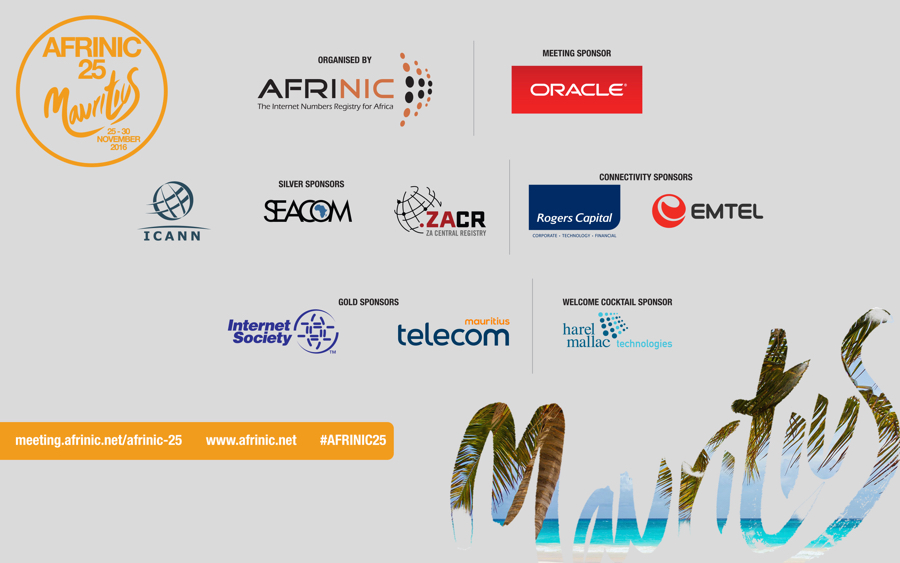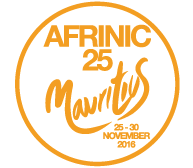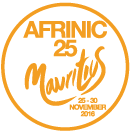Highlights Tuesday 29 November


The Policy Development Working Group (PDWG) session commenced at 11:00. Adewole Ajao, PDWG Co-Chair welcomed the attendees and outlined the day's agenda.
The following policy proposals were discussed:
AFPUB-2016-GEN-002-DRAFT-01: Inbound Transfers Policy
- This policy caters for inbound transfers of resources from other RIRs to the AFRINIC service region (without allowing transfers to flow out of the continent to other RIR service regions). It is premised on the fact that eventually, AFRINIC will, too, run out of IPv4 space, and this will give the opportunity to companies that can afford to acquire space from the transfer market to bring that space into AFRINIC.
- Discussion focused on the fact that the policy slows down IPv6 deployment in the region, and that there is no compelling motivation to allow inbound transfers from other RIRs because their IPv4 pools are all near exhaustion, yet AFRINIC has the largest IPv4 pool.
- Outcome: No consensus -Back to the list for additional discussion
AFPUB-2016-GEN-001-DRAFT02: Internet Number Resources review by AFRINIC
- This policy gives AFRINIC authority to conduct regular reviews/audits of resource utilization to ensure efficient and appropriate use of resources. It allows for recovery of any type of resource where usage is not in compliance with the RSA or policy, or both.
- Discussion focused on possible abuse by competing organizations that can trigger audits against each other to frustrate business, that the RSA provides for audits and action against non compliance and AFRINIC may face possible litigation consequences if some sensitive information is published in the required audit reports publicly.
- Outcome: No consensus - Back to the list for additional discussion
AFPUB-2016-V4-003-DRAFT02: IPv4 Resources Transfer within AFRINIC region
- This policy proposal aims to solve the issue around enabling African organisations to still be able to get IPv4 number resources even after IPv4 pool exhaustion or when AFRINIC can no longer satisfy the needs of such organisations. The idea is to meet the needs of late IPv4 resource requestors and the goal of this policy proposal is to define conditions under which transfers can occur.
- Discussion focused on clarifying how the proposal addresses IPv4 Legacy Resource Holders and the need to make the policy active immediately (rather than activating it during Phase 2 of Soft Landing).
- Outcome: Consensus -Proposal Moves to Last Call on condition that authors include provisions (above) requested by the community.
AFPUB-2016-V4-001-DRAFT03: IPv4 Soft Landing – BIS
- This proposal aims at introducing some provisions to the current soft landing policy to cater for reserving space to critical Internet infrastructure, making a provision for late requestors and stipulating an IPv6 requirement for any company that requests space from the last /8.
- Authors of the proposal acknowledged that since there is a competing proposal on the table, both proposals would realistically not be accepted through rough consensus, and opted to have the proposal moved back to the mailing list to allow them work with the authors of the "IPv4 Soft Landing Overhaul" proposal towards a common problem statement and overall unified proposal that addresses that problem.
- Outcome: No consensus - Back to the list for additional discussion
AFPUB-2016-V4-002-DRAFT01: Proposal: IPv4 Soft Landing Overhaul
- The proposal aims at maintaining the needs-based approach to issuing IPv4 space (by completely removing the current IPv4 Soft Landing Policy) because further delaying the depletion of IPv4 address space may well be holding the region back towards IPv6 deployment - while the rest of the world moves on, leaving Africa at a significant disadvantage. The proposal also provides for new entrants to get IPv4 space from a reserved block.
- It was noted that the problem statement in the proposal is not convincing, since realistic transition to IPv6 still requires IPv4 for now, hence the need for the two to co-exist, and that the reason why each RIR was issued with a /8 from the last five (where AFRINIC got 102/8) was to enable a framework for IPv6 transition among others reasons, not to quickly burn through IPv4.
- Outcome: No consensus - Back to the list for additional discussion (Note: Authors withdrew the proposal thereafter)
You can find videos of the PD-WG Sessions here.
RIR, IANA and ASO Updates
The first sessionof theday began with updates from the four other RIRs - APNIC, ARIN, LACNIC, and the RIPE NCC. There was also an update on the Address Supporting Organization's (ASO) activities and a report on Internet Assigned Numbers Authority (IANA) activities.
You can find videos of each presentation here.
Gala Dinner

Around 150 attendees gathered at the Sofitel to enjoy the AFRINIC-25 Gala Dinner. The evening began with a traditional Mauritian dance and Alan Barrett, AFRINIC CEO, welcomed the attendees and thanked the Gala Dinner sponsor and the AFRINIC-25 sponsors for their generous support. The sponsors received a souvenir as token of appreciation. The evening continued with dinner, dancing and informal networking.
Stay Informed!
- Don't forget, you can also keep up-to-date by following our Twitter account (tag your photos and comments with the #AFRINIC25 hashtag), liking our Facebook page and following our Flickr account.
- View the Agenda | Find out how to participate remotely.
Thank You to Our Sponsors!





